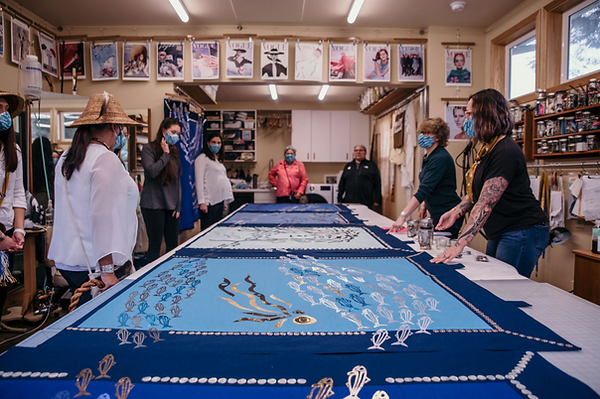
SHEET'ká KWáAN

LINGít AANí
The herring lady would go down to that rock and sing to the yaaw (herring). She was inviting the herring to come to her. They came to her because of her respect for them. She fell asleep one day on that rock. When the tide came in her hair was floating in the water and the yaaw came and laid gháax’w (herring eggs) in her hair. Thats why today Kiks.ádi women are known as Kaxhatjaashaa the flipping ladies or the herring ladies
Kiks.ádi women carry on the responsibilities from these original instructions through ceremony and collective organizing. The Herring Protectors spawned from the commitment to the original teaching. We seek to honor the yaaw by supporting Indigenous harvesters, practicing Indigenous science, and reinvigorating Lingít ceremony. By assuring the abundance of the yaaw population for generations to come we are exercising our sovereign rights.
"Out back, next door, they were showing their faces as they danced. He looked inside the house where they were dancing. He stuck his face into the house, and his whole face became herring roe. What do you know, it was the Herring People telling ancient stories and dancing. Their spirits were joyful."
— from the Kiks.ádi story Aak'wataatseen, told by Kaadashán John Katishan

Please watch this trailer to our 20 minute film. If you would like to screen this film, please contact us at herringprotectors@gmail.com

A Connection to Everything
Herring connect us culturally, spiritually, and historically. They are the foundation of all things we love in Southeast Alaska. From salmon to seals, eagles to whales, or blanched eggs on our stove tops, herring provide critical energy and nutrition to our communities and ocean ecosystems.
Photo: Lee House

Commercial Over-fishing
For over thirty years, elders, culture-bearers, and the Sitka Tribe of Alaska have declared that they are witnessing a herring population decline. Despite this, the Alaska Department of Fish and Game continues to manage a commercial fishery that pull tens of thousands of tons of herring from the waters of Sheet'ká each spring.
Photo: Lee House

Photo: Lee House


Photo: Caitlin Blaisdell

Join the Efforts of Many
Our work wouldn't be possible without the support of a diverse, grassroots web of activists, culture-bearers, organizers, artists, and so many more.
Whether to help harvest eggs on branches, show up at a demonstration, share a social media post, or prep gifts for the next Herring Koo.éex', there is always a way to support. Add your email to our list to be notified of our future happenings and volunteer opportunities.
Photo: Lee House

Photo: Caitlin Blaisdell

Photo: Lee House

Photo: Muriel Reid

Photo: Muriel Reid





